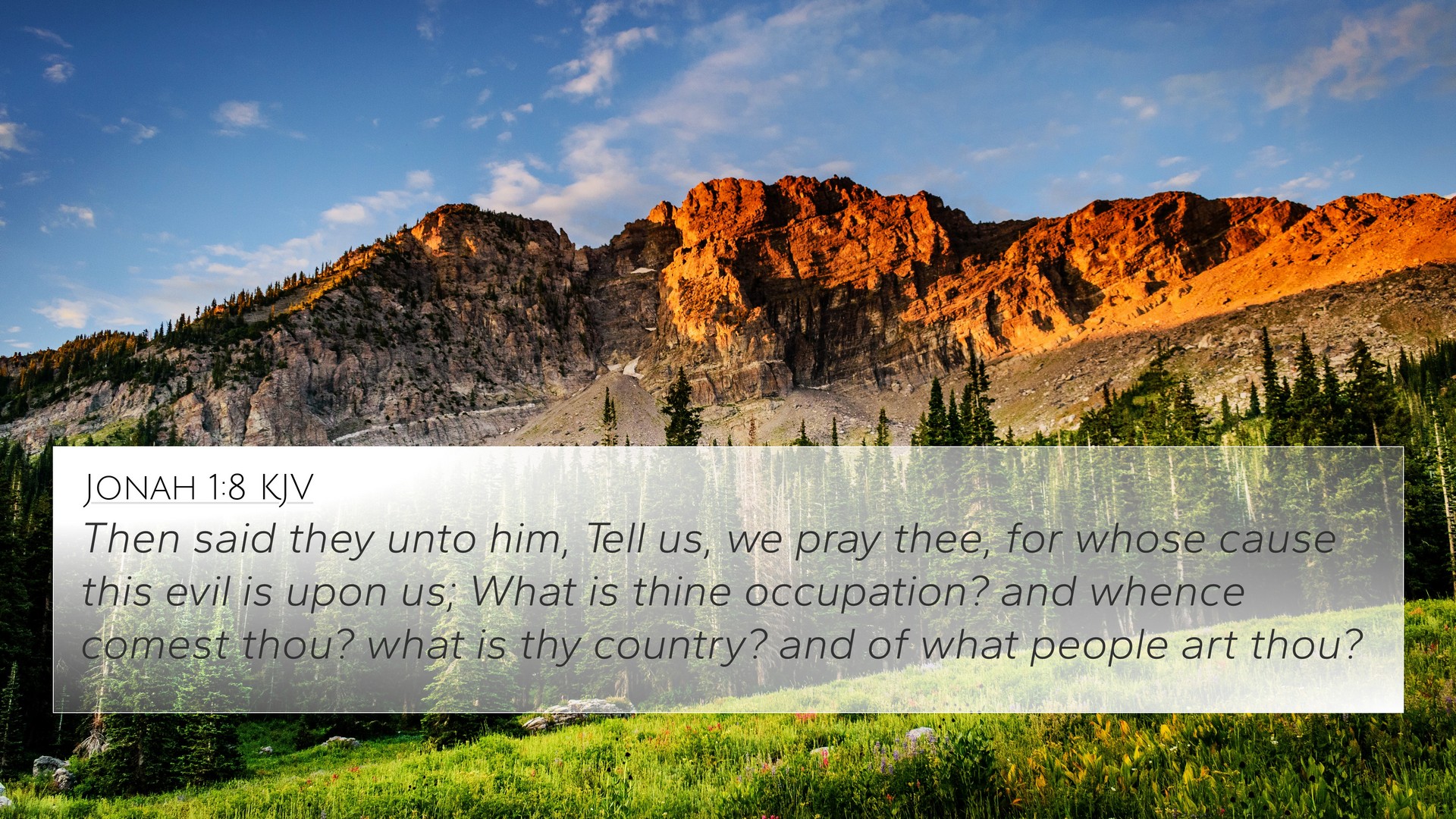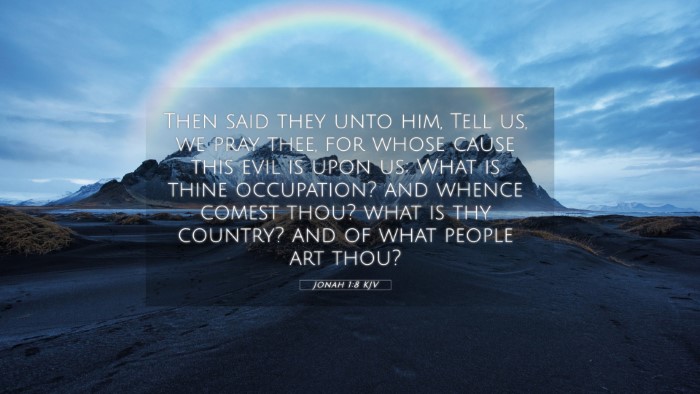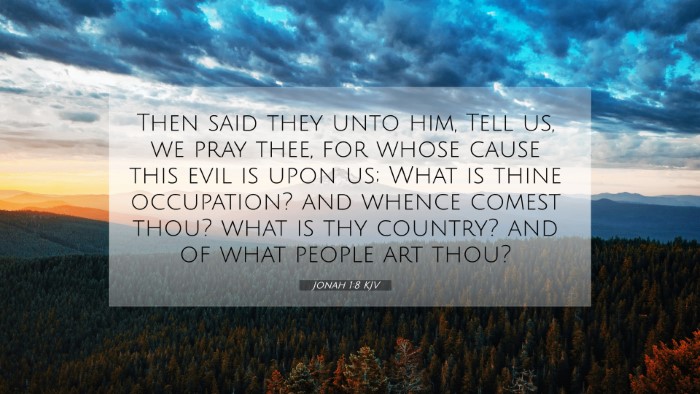Old Testament
Genesis Exodus Leviticus Numbers Deuteronomy Joshua Judges Ruth 1 Samuel 2 Samuel 1 Kings 2 Kings 1 Chronicles 2 Chronicles Ezra Nehemiah Esther Job Psalms Proverbs Ecclesiastes Song of Solomon Isaiah Jeremiah Lamentations Ezekiel Daniel Hosea Joel Amos Obadiah Jonah Micah Nahum Habakkuk Zephaniah Haggai Zechariah MalachiJonah 1:8 Similar Verses
Jonah 1:8 Cross References
Then said they unto him, Tell us, we pray thee, for whose cause this evil is upon us; What is thine occupation? and whence comest thou? what is thy country? and of what people art thou?
Uncover the Rich Themes and Topics of This Bible Verse
Listed below are the Bible themes associated with Jonah 1:8. We invite you to explore each theme to gain deeper insights into the Scriptures.
Jonah 1:8 Cross Reference Verses
This section features a detailed cross-reference designed to enrich your understanding of the Scriptures. Below, you will find carefully selected verses that echo the themes and teachings related to Jonah 1:8 KJV. Click on any image to explore detailed analyses of related Bible verses and uncover deeper theological insights.
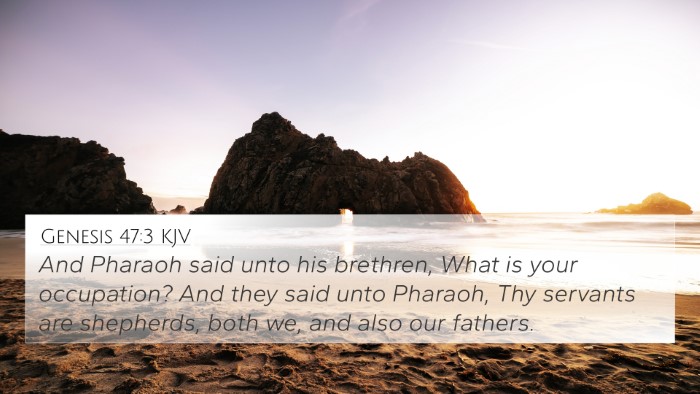
Genesis 47:3 (KJV) »
And Pharaoh said unto his brethren, What is your occupation? And they said unto Pharaoh, Thy servants are shepherds, both we, and also our fathers.
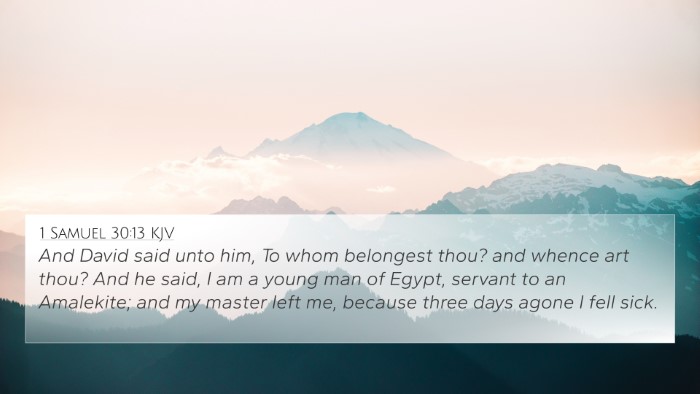
1 Samuel 30:13 (KJV) »
And David said unto him, To whom belongest thou? and whence art thou? And he said, I am a young man of Egypt, servant to an Amalekite; and my master left me, because three days agone I fell sick.
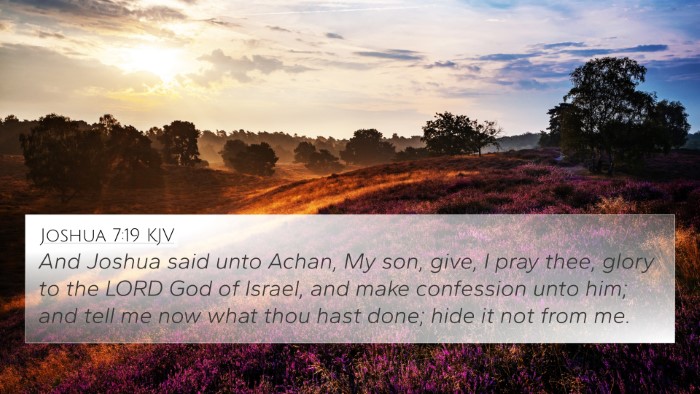
Joshua 7:19 (KJV) »
And Joshua said unto Achan, My son, give, I pray thee, glory to the LORD God of Israel, and make confession unto him; and tell me now what thou hast done; hide it not from me.
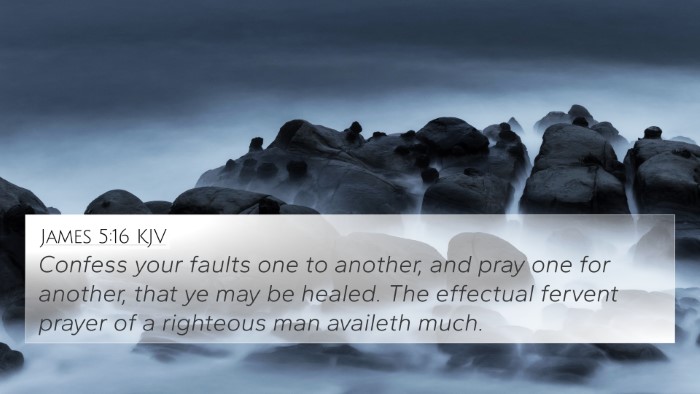
James 5:16 (KJV) »
Confess your faults one to another, and pray one for another, that ye may be healed. The effectual fervent prayer of a righteous man availeth much.
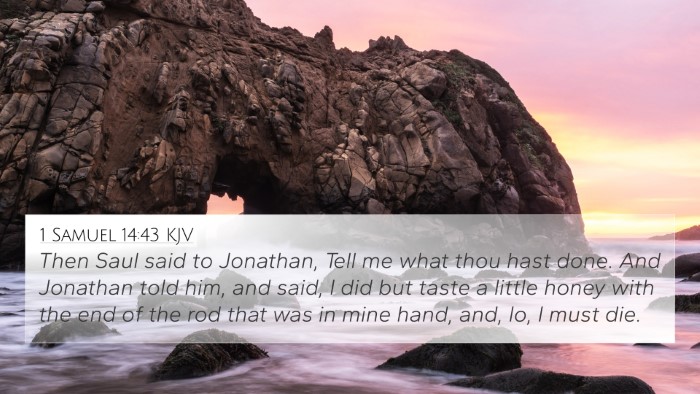
1 Samuel 14:43 (KJV) »
Then Saul said to Jonathan, Tell me what thou hast done. And Jonathan told him, and said, I did but taste a little honey with the end of the rod that was in mine hand, and, lo, I must die.
Jonah 1:8 Verse Analysis and Similar Verses
Understanding Jonah 1:8
In Jonah 1:8, we find a pivotal moment in the story of the prophet Jonah, where he is confronted by the sailors about the storm that threatens their lives. The verse states:
"Then said they unto him, Tell us, we pray thee, for whose cause this evil is upon us; What is thine occupation? and whence comest thou? what is thy country? and of what people art thou?"
Meaning and Interpretation
This verse raises crucial questions about identity and accountability. The sailors, experiencing a fierce storm, recognize that there must be a reason for the calamity, and their inquiry into Jonah's identity reflects their desperate search for understanding. According to Matthew Henry, this moment illustrates how divine judgment often provokes inquiry and self-reflection. The sailors' questions not only reveal their fear but also serve as a mirror for Jonah’s own conscience and role in the unfolding events.
Albert Barnes emphasizes that Jonah's reluctance to reveal his identity signifies a deeper spiritual struggle. The act of questioning implies that there is an expectation of responsibility, both from Jonah and from God. The sailors are seeking answers, much as individuals in crisis often turn to God or spiritual inquiry to understand their circumstances.
Adam Clarke further elaborates that the profoundness of this question—asking for Jonah’s occupation, country, and people—highlights a broader theme of God's omnipotence and the humanity's accountability before Him. The inquiry not only aims to assess the cause of distress but also to ultimately seek deliverance.
Cross-References
In understanding Jonah 1:8, it is helpful to explore related Bible verses that add depth to its meaning:
- Psalm 69:1-3: A prayer of distress similar to the sailors' predicament.
- Matthew 12:40: Jesus' reference to Jonah in relation to His own resurrection.
- Luke 10:30-37: The Good Samaritan teaches about identity through actions.
- Romans 14:12: Each of us will give an account of ourselves to God.
- Proverbs 28:1: The wicked flee when no one pursues, tying into Jonah's running away from God.
- John 4:24: God is spirit, indicating the complexity of divine identity.
- Hebrews 4:13: No creature is hidden from His sight, emphasizing accountability.
- Isaiah 43:1: God’s assurance of His people’s identity.
- Matthew 28:19-20: The Great Commission and the idea of calling and identity in Christ.
- Acts 10:28: The Gospel breaking ethnic barriers, resonating with Jonah's own prejudice.
Thematic Connections
This verse invites us to observe the connections between Bible verses that illustrate the themes of identity, responsibility, and divine intervention. As the sailors' trust shifts due to Jonah’s revelation, we are reminded of the need for integrity in our spiritual lives. Cross-referencing Biblical texts like Jonah 1:8 can provide profound lessons on accountability and the impact of our actions on others.
Tools for Bible Cross-Referencing
To explore Bible verses that relate to each other more effectively, here are some strategies:
- Utilize a Bible concordance to find thematic connections.
- Engage with a Bible cross-reference guide during studies.
- Incorporate Bible reference resources for deeper insights.
- Explore Bible chain references for systematic study.
- Apply cross-referencing Bible study methods in group discussions.
Inter-Biblical Dialogue
Jonah 1:8 not only stands alone but creates an inter-Biblical dialogue that interlinks narratives across both Testaments. The challenges of the sailors may reflect the ongoing issues faced by believers throughout the ages—struggling with faith and understanding in times of turmoil.
Thus, understanding Jonah 1:8 involves recognizing our own identity and responsibility in the narrative of faith, as well as the wider connections that this verse has with others throughout the Bible.
